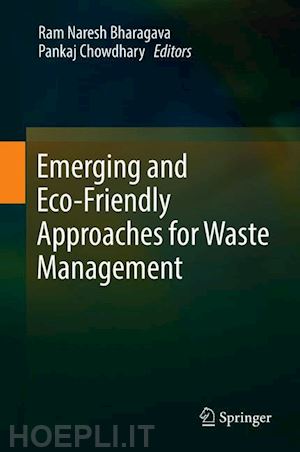
Questo prodotto usufruisce delle SPEDIZIONI GRATIS
selezionando l'opzione Corriere Veloce in fase di ordine.
Pagabile anche con Carta della cultura giovani e del merito, 18App Bonus Cultura e Carta del Docente
Rapid industrialization is a serious concern in the context of a healthy environment. With the growth in the number of industries, the waste generated is also growing exponentially. The various chemical processes operating in the manufacturing industry generate a large number of by-products, which are largely harmful and toxic pollutants and are generally discharged into the natural water bodies. Once the pollutants enter the environment, they are taken up by different life forms, and because of bio-magnification, they affect the entire food chain and have severe adverse effects on all life forms, including on human health. Although, various physico-chemical and biological approaches are available for the removal of toxic pollutants, unfortunately these are often ineffective and traditional clean up practices are inefficient. Biological approaches utilizing microorganisms (bacterial/fungi/algae), green plants or their enzymes to degrade or detoxify environmental pollutants such as endocrine disruptors, toxic metals, pesticides, dyes, petroleum hydrocarbons and phenolic compounds, offer eco- friendly approaches. Such eco-friendly approaches are often more effective than traditional practices, and are safe for both industry workers as well as environment.
This book provides a comprehensive overview of various toxic environmental pollutants from avariety natural and anthropogenic sources, their toxicological effects on the environment, humans, animals and plants as well as their biodegradation and bioremediation using emerging and eco-friendly approaches (e.g. Anammox technology, advanced oxidation processes, membrane bioreactors, membrane processes, GMOs), microbial degradation (e.g. bacteria, fungi, algae), phytoremediation, biotechnology and nanobiotechnology. Offering fundamental and advanced information on environmental problems, challenges and bioremediation approaches used for the remediation of contaminated sites, it is a valuable resource for students, scientists and researchers engaged in microbiology, biotechnology and environmental sciences.
Dr. Ram Naresh Bharagava is presently working as Assistant Professor at the Department of Environmental Microbiology, Babasaheb Bhimrao Ambedkar University, Uttar Pradesh, India.
Dr. Pankaj Chowdhary is currently working as a research scholar at Department of Environmental Microbiology, Babasaheb Bhimrao Ambedkar University, Uttar Pradesh, India. His work focuses on distillery wastewater pollutants and their effect on the environment. He has published 6 book chapters, 5 academic papers and 2 magazine articles. He has also presented a conference paper.











Il sito utilizza cookie ed altri strumenti di tracciamento che raccolgono informazioni dal dispositivo dell’utente. Oltre ai cookie tecnici ed analitici aggregati, strettamente necessari per il funzionamento di questo sito web, previo consenso dell’utente possono essere installati cookie di profilazione e marketing e cookie dei social media. Cliccando su “Accetto tutti i cookie” saranno attivate tutte le categorie di cookie. Per accettare solo deterninate categorie di cookie, cliccare invece su “Impostazioni cookie”. Chiudendo il banner o continuando a navigare saranno installati solo cookie tecnici. Per maggiori dettagli, consultare la Cookie Policy.